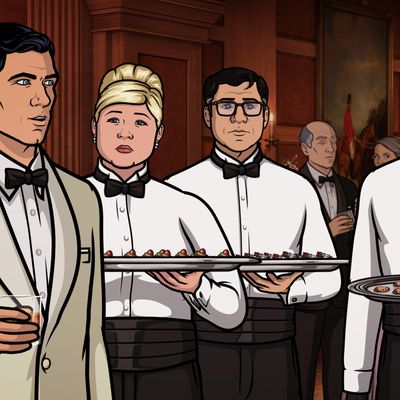
Archer appreciates the simple joys of language. The show’s writers treat English (and, frequently, tidbits from foreign tongues) as a complex plaything to be endlessly reconfigured. The characters often act like comedy writers, amusing themselves with puns and one-liners for their own sake. (When Ray responds to Pam’s diss of Otto Von Jizzmark by saying he would’ve gone with Franz Turdinand, it may as well be a direct transcript from a writers’ room.) Even during the most heated action scenes, there’s always time for Archer to stop what he’s doing and brainstorm the perfect wordplay. The dialogue nests phrases within phrases, ideas within ideas, mimicking the informal patterns of actual human speech.
To wit: Mallory opens “Bel Panto: Part One” in the middle of a meeting, working her mouth around the line ” … which brings us to our penultimate item, which concerns, yet again, and to no great surprise, the restrooms, specifically the towel dispensers.” After seven seasons, it should come as no surprise that Archer treats writing as an art with self-evident worth.
But in a more general sense, the Archer writers have a deft understanding of how language works. All the familiar faces at the Figgis Agency speak in a hypercolloquial vernacular built both from real-world shorthand and in-show shibboleth, much like the way friends develop inside jokes. When groups of people spend a lot of time together, their linguistic habits meet in the middle and form a unified dialect all their own. These characters understand one another when they begin a sentence with, “Which … ” or yell, “Phrasing!” out of nowhere — and so do we. “Bel Panto” stands as a miniature monument to the elastic capabilities of words, whether it’s a pun that stitches the last line of one scene corresponds to the first of another, or Cheryl spiraling into an increasingly asinine monologue that ends with, “What ever happened to blimps?”
“Bel Panto” belongs to the best category of Archer episodes, wherein the entire ensemble gets transplanted into a self-contained situation and assumes new roles to handle their surroundings. It bears more than a passing similarity to season four’s “Live and Let Dine,” which placed the agency formerly known as ISIS undercover in a five-star restaurant. This week’s episode sends them to a high-society fundraiser for the Tinnitus Foundation (a cause close to Archer’s heart, and even closer to his perma-perforated eardrums) to protect a valuable necklace worn by Veronica Deane. It takes approximately ten seconds for them to get entangled in the long-simmering enmity between Veronica and her ex-husband Ellis Crane (voiced by John O’Hurley, continuing this season’s streak of well-placed guest actors), a silver-fox director in the tradition of golden-age staples like Howard Hawks and William Wyler. As Ray, Pam, and Cheryl seethe about getting stuck on hired-help detail, Archer immediately attempts to fulfill his fantasy of bedding a movie star, and Lana strikes back at him in the most convenient available way by hitting on Ellis. In terms of plot, it’s nothing new, though the extended presence of Veronica and Patton Oswalt’s sleazy lawyer suggests Adam Reed and his writers may be playing a long game.
This episode excels by flexing Archer’s true strength: setting its characters loose in peculiar surroundings, where they must react to one another. Activities as simple as chatting about nothing, or even chatting about chatting, play like action scenes under Reed’s skillful pen. (Not to mention the actual action scenes, of which this episode has few.) When Archer kills the pink-colored gunman in the secret chamber he and Veronica have claimed as a base, she’s visibly horrified. But as he explains to her, if he had let the guy live, he would’ve almost certainly escaped or called for help or otherwise fouled up the plan. The gang might be in Hollywood, but this story doesn’t follow a typical formula. It obviously isn’t real life, either. Archer occupies a fascinating space in between. He’s a cartoon that talks like a human being.
Assorted Thoughts and Questions:
- As the episode’s title suggests, the hostage plotline was lifted from Ann Patchett’s 2001 novel Bel Canto, which was itself based on a 126-day hostage crisis at a Japanese embassy in Peru. Terrorists really did let all but the most high-value hostages go, and the episode spins a great joke out of the absurdity of keeping “just the core group” around. Cheryl falling in love with her captor is a nod to the novel/incident as well, though it’s uniquely Archer in its manic one-sidedness.
- For anyone who, like me, didn’t know: The “Mc10:35” is a secret McDonald’s menu item forged from the innards of a McDouble stuffed into an Egg McMuffin. Back in the day, it was only available during the small window of time in which McDonald’s served breakfast and lunch, but times have changed.
- The vast majority of those harebrained “fan theories” busting open pop-culture secrets are total nonsense, but Ray’s got my full attention with his inkling that “Casper and Spooky were raped and murdered by Stevie!”
- Of Pam’s many running jokes and sexually graphic catchphrases, her overdrawn humping of the gyros she always seems to be eating might be my favorite. And Amber Nash’s calm delivery of “I will stop, but I will not apologize” is the pinnacle of poise.

